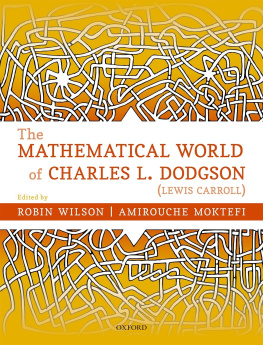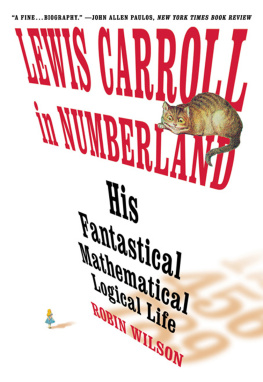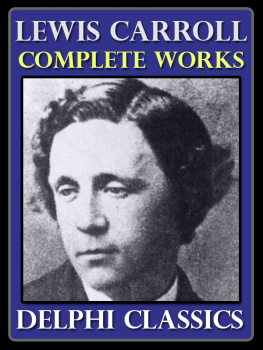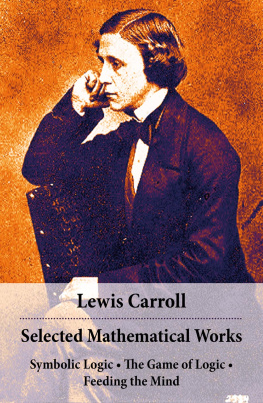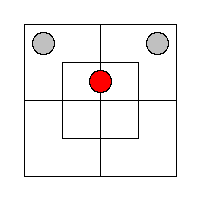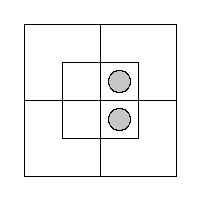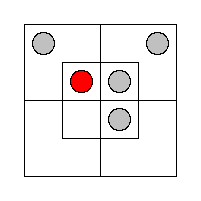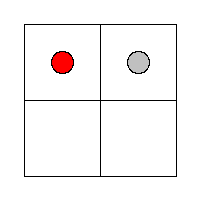Lewis Carroll (Charles Lutwidge Dodgson) - Symbolic Logic
Here you can read online Lewis Carroll (Charles Lutwidge Dodgson) - Symbolic Logic full text of the book (entire story) in english for free. Download pdf and epub, get meaning, cover and reviews about this ebook. year: 1897, publisher: Macmillan, genre: Science. Description of the work, (preface) as well as reviews are available. Best literature library LitArk.com created for fans of good reading and offers a wide selection of genres:
Romance novel
Science fiction
Adventure
Detective
Science
History
Home and family
Prose
Art
Politics
Computer
Non-fiction
Religion
Business
Children
Humor
Choose a favorite category and find really read worthwhile books. Enjoy immersion in the world of imagination, feel the emotions of the characters or learn something new for yourself, make an fascinating discovery.
- Book:Symbolic Logic
- Author:
- Publisher:Macmillan
- Genre:
- Year:1897
- Rating:4 / 5
- Favourites:Add to favourites
- Your mark:
- 80
- 1
- 2
- 3
- 4
- 5
Symbolic Logic: summary, description and annotation
We offer to read an annotation, description, summary or preface (depends on what the author of the book "Symbolic Logic" wrote himself). If you haven't found the necessary information about the book — write in the comments, we will try to find it.
Symbolic Logic — read online for free the complete book (whole text) full work
Below is the text of the book, divided by pages. System saving the place of the last page read, allows you to conveniently read the book "Symbolic Logic" online for free, without having to search again every time where you left off. Put a bookmark, and you can go to the page where you finished reading at any time.
Font size:
Interval:
Bookmark:
The Project Gutenberg EBook of Symbolic Logic, by Lewis Carroll
This eBook is for the use of anyone anywhere at no cost and with
almost no restrictions whatsoever. You may copy it, give it away or
re-use it under the terms of the Project Gutenberg License included
with this eBook or online at www.gutenberg.net
Title: Symbolic Logic
Author: Lewis Carroll
Release Date: May 5, 2009 [EBook #28696]
Language: English
*** START OF THIS PROJECT GUTENBERG EBOOK SYMBOLIC LOGIC ***
Produced by Tony Browne, Geetu Melwani, Greg Weeks, L.
Lynn Smith and the Online Distributed Proofreading Team
at http://www.pgdp.net
pg_ii
pg_iii
pg_iv
|
FOURTH EDITION
MACMILLAN AND CO., Limited
new york: the macmillan company
1897
london and bungay
An envelope, containing two blank Diagrams (Biliteral and Triliteral) and 9 counters (4 Red and 5 Grey), may be had, from Messrs. Macmillan, for 3d., by post 4d.
I shall be grateful to any Reader of this book who will point out any mistakes or misprints he may happen to notice in it, or any passage which he thinks is not clearly expressed.
I have a quantity of MS. in hand for Parts II and III, and hope to be ableshould life, and health, and opportunity, be granted to me, to publish them in the course of the next few years. Their contents will be as follows:
Further investigations in the subjects of Part I. Propositions of other forms (such as Not-all x are y). Triliteral and Multiliteral Propositions (such as All abc are de). Hypotheticals. Dilemmas. &c. &c.
Analysis of a Proposition into its Elements. Numerical and Geometrical Problems. The Theory of Inference. The Construction of Problems. And many other Curiosa Logica.
The chief alterations, since the First Edition, have been made in the Chapter on Classification (). The chief additions have been the questions on words and phrases, added to the Examination-Papers at p. 94, and the Notes inserted at pp. 164, 194.
In Book I, Chapter II, I have adopted a new definition of Classification, which enables me to regard the whole Universe as a Class, and thus to dispense with the very awkward phrase a Set of Things.
In the Chapter on Propositions of Existence I have adopted a new normal form, in which the Class, whose existence is affirmed or denied, is regarded as the Predicate, instead of the Subject, of the Proposition, thus evading a very subtle difficulty which besets the other form. These subtle difficulties seem to lie at the root of every Tree of Knowledge, and they are far more hopeless to grapple with than any that occur in its higher branches. For example, the difficulties of the Forty-Seventh Proposition of Euclid are mere childs play compared with the mental torture endured in the effort to think out the essential nature of a straight Line. And, in the present work, the difficulties of the 5 Liars Problem, at p. 192, are trifles, light as air, compared with the bewildering question What is a Thing?
In the Chapter on Propositions of Relation I have inserted a new Section, containing the proof that a Proposition, beginning with All, is a Double Proposition (a fact that is quite independent of the arbitrary rule, laid down in the next Section, that such a Proposition is to be understood as implying the actual existence of its Subject). This proof was given, in the earlier editions, incidentally, in the course of the discussion of the Biliteral Diagram: but its proper place, in this treatise, is where I have now introduced it.
pg_ix In the Sorites-Examples, I have made a good many verbal alterations, in order to evade a difficulty, which I fear will have perplexed some of the Readers of the first three Editions. Some of the Premisses were so worded that their Terms were not Specieses of the Univ. named in the Dictionary, but of a larger Class, of which the Univ. was only a portion. In all such cases, it was intended that the Reader should perceive that what was asserted of the larger Class was thereby asserted of the Univ., and should ignore, as superfluous, all that it asserted of its other portion. Thus, in Ex. 15, the Univ. was stated to be ducks in this village, and the third Premiss was Mrs. Bond has no gray ducks, i.e. No gray ducks are ducks belonging to Mrs. Bond. Here the Terms are not Specieses of the Univ., but of the larger Class ducks, of which the Univ. is only a portion: and it was intended that the Reader should perceive that what is here asserted of ducks is thereby asserted of ducks in this village. and should treat this Premiss as if it were Mrs. Bond has no gray ducks in this village, and should ignore, as superfluous, what it asserts as to the other portion of the Class ducks, viz. Mrs. Bond has no gray ducks out of this village.
In the Appendix I have given a new version of the Problem of the Five Liars. My object, in doing so, is to escape the subtle and mysterious difficulties which beset all attempts at regarding a Proposition as being its own Subject, or a Set of Propositions as being Subjects for one another. It is certainly, a most bewildering and unsatisfactory theory: one cannot help feeling that there is a great lack of substance in all this shadowy hostthat, as the procession of phantoms glides before us, there is not one that we can pounce upon, and say Here is a Proposition that must be either true or false!that it is but a Barmecide Feast, to which we have been biddenand that its prototype is to be found in that mythical island, whose inhabitants earned a precarious living by taking in each others washing! By simply translating telling 2 Truths into taking
Font size:
Interval:
Bookmark:
Similar books «Symbolic Logic»
Look at similar books to Symbolic Logic. We have selected literature similar in name and meaning in the hope of providing readers with more options to find new, interesting, not yet read works.
Discussion, reviews of the book Symbolic Logic and just readers' own opinions. Leave your comments, write what you think about the work, its meaning or the main characters. Specify what exactly you liked and what you didn't like, and why you think so.






